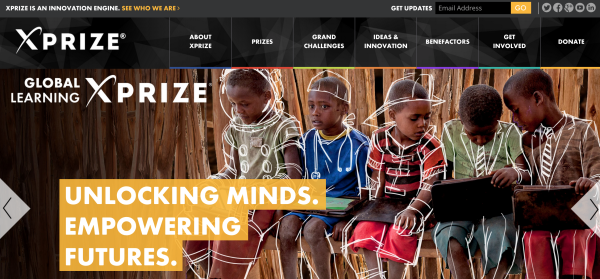Over the past 20 years, the XPRIZE Foundation has become famous for sparking private sector innovation in space technology and exploration. Their latest challenge, the Global Learning XPRIZE, doesn’t literally reach for the stars, but is just as ambitious: it aims to bring education to every child in the world, especially the 250 million children around the world who cannot read, write or do basic math. Blending technology and education is not a foreign concept to Silicon Valley: entrepreneurs have been creating MOOCs (massive open online courses, for the uninitiated), code camps and teaching tools for years. However, Matt Keller, Senior Director of the Global Learning XPRIZE, assured me that this challenge wants to create something different.
“There’s 60 million kids around the world who don’t have physical access to teachers. Can we make technology and content that is so intuitive that children can teach themselves and each other?” Keller asked.
Keller’s background as Vice-President of One Laptop per Child makes him perhaps one of the most qualified people to discuss technology-enabled learning – the Global Learning XPRIZE’s mission statement reads almost identically to One Laptop per Child’s: to bring software and content to children in developing countries in order to spark self-empowered learning. Supporting this lofty goal is a $15 million prize, with $1 million awarded to each of the five finalists and $10 million awarded to the ultimate winner.
While registration ends on April 30, 2015, competitors have until Nov. 2016 to work on their open-source software and content solutions, which must be offered in both English and Swahili. This initial round of submissions is vetted by judges until five teams remain. The solutions of these five finalists then undergo an 18-month pilot program: each solution is given – along with Android tablets – to approximately 3,000 children in a developing country (likely in Sub-Saharan Africa). The ultimate winner is selected by the results – whichever solution produces the largest improvements in reading, writing and arithmetic proficiency will be the winner. Post-competition, all five finalist solutions are released to the world as open-source.
Keller encourages anyone interested in transforming education to apply immediately. The Global Learning XPRIZE helps individuals find team members from around the world. It’s clear that this challenge can’t be tackled alone. Keller estimates that “a good team size is probably around 10 people.” Even if someone doesn’t have a programming background, they can bring meaningful impact to a team.
“Teams need programming expertise, but teams will need many other backgrounds, especially neuroscience, graphic art, gaming, local content and storytelling,” Keller speculated.
“Proving that kids can really teach themselves without adults is a big if,” Keller added. “But if we can prove it, we’ll have discovered something huge. It can be an answer to a real, global crisis.”
And just as Keller believes that children will use this technology if given the opportunity, he’s betting that – if the Global Learning XPRIZE confirms that software and content can enable self-education – hardware innovation will follow.
The Global Learning XPRIZE is an opportunity to be a part of what Keller labels “a civilization-wide transformation.” Keller urges “anyone with even an inkling to get involved,” as it is a competition open to students and working professionals alike.
Registration and additional information can be found at http://learning.xprize.org/. The registration deadline is April 30, 2015.
Contact Kendrick Kho at kkho207 ‘at’ stanford.edu.
